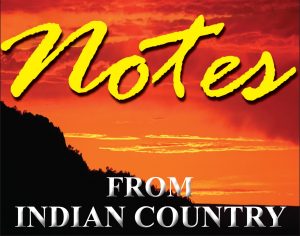What would Black Elk say?
 There are some things that trip my wire faster than anything and if I come across as slightly perturbed it is because I am.
There are some things that trip my wire faster than anything and if I come across as slightly perturbed it is because I am.
Over the past few weeks the talk from the Catholic Church has been about the canonization of Black Elk. I suppose that is fine and dandy. The Church can make saints out of whomever they choose, but it is my personal opinion that this goes beyond the pale, literally. Several months ago I wrote that I was a recovering Catholic. What is happening today only bolsters the speed of my recovery.
For instance, Black Elk was not thinking of the Catholic Church or of the benevolence of the white man when he said: “I can still see the butchered women and children lying heaped and scattered all along the crooked gulch as plain as when I saw them with eyes still young. And I can see that something else died there in the bloody mud, and was buried in the blizzard. A people’s dream died there. It was a beautiful dream . . . the nation’s hoop is broken and scattered.”
He saw everything that was beautiful about the Lakota die in the snow at Wounded Knee on that December day in 1890. If he converted to Catholicism after witnessing this horrific scene perhaps it was because he believed there was nothing else left to cling to; the old ways were dead and gone.
Black Elk Peak, formerly known as Harney Peak, is a sacred site in the Black Hills of South Dakota. Basil Brave Heart, a Lakota Korean veteran, spearheaded the movement to honor Black Elk.
The assault on Black Elk’s traditional religion by the United States Government bolstered by the urging of the Catholic, Episcopalian, Methodist, and Mormon Churches among others, caused the holy men of many Indian nations to be shackled and jailed. The centuries old religious rituals of the Lakota, Navajo, and Hopi and of other tribes were outlawed.
The edict at the time was “You may have religion once again as long as it is ours.” Now I ask you, where in the holy heck were the leaders of the Catholic Church or of any of the other Christian religions while the religions of the indigenous people were being wiped from the face of the earth? They not only rejoiced in the destruction of the Indian religions, they encouraged it.
There were several Lakota leaders that stood their ground. The great Lakota warrior Crazy Horse never touched a pen to a treaty nor did he ever accept the religious overtures of the Christian missionaries. Until the day he was assassinated at Fort Robinson he had dedicated his life to fighting for the freedom and independence of his people.
Crazy Horse said, “We preferred our own way of living. We were no expense to the government. All we wanted was peace and to be left alone.” And he meant to be left alone by everybody including the black robed priests of the Catholic Church.
Perhaps it will be a feather in the cap of the Catholic Church to add Black Elk to their long list of Saints and it will without a doubt lift their standings among many converted Lakota, but thank goodness that there are still those Lakota out there who refused to bend or succumb to a foreign religion, but instead hung on to the traditional beliefs of their ancestors.
Early on we were taught in the Catholic boarding schools the meaning of a venial and mortal sin. We also learned that there was only one true religion and that was the Catholic religion and that all others were false religions including that of our grandparents and elders. To practice a religion other than that of the Catholic Church was a mortal sin. Our ancestors were sinners.
And so it was under this dark cloud that so many of us grew up. In order to explain the harsh teachings of the Catholic Church many converts say “we all worship the same God.” But do we? If we choose not to worship any God what does that mean? Many of us had to unburden ourselves of the myths and misconceptions forced upon us and some made it and others didn’t.
Whether Black Elk is canonized or not is out of the hands of the traditional Holy Men. And to those of us who have cast off the yoke of all religions, it is also out of our hands.
(Contact Tim Giago at najournalist1@gmail.com. Tim was the founder, and first editor and publisher of Indian Country Today)
